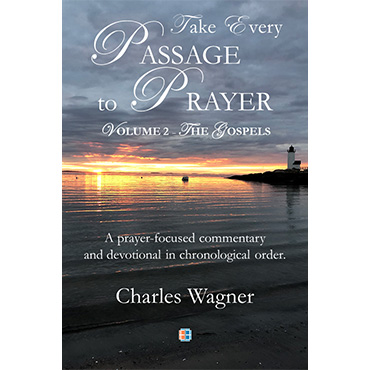The Gramazin Blog

Jesus’ Disciples Make Excuses About Ministry Service
Take Every Passage to Prayer - Volume 2, The Gospels
Saturday July 13, 2024
Matthew 8:18-22, Luke 9:57-62
Father, please help me to commit my life full-time to the building of the Kingdom of God. I don’t want to offer any feeble excuses to You. I want to give up my life for You because You gave up Your life for me. I want to get up in the morning desiring to serve You every hour of the day. I want to return to bed at night reflecting on a busy day of ministry where You used me to bless others. Father, please make me this kind of man. Amen.
Father, as Jesus taught by the Sea of Galilee the crowds continued to swell. Jesus wanted to find some space away from the crowd. He instructed His disciples that they will take a boat across to the other side of the lake.
A teacher of the law, who apparently considered himself a disciple, approached Jesus and said:
“I will follow You wherever You go (NIV).”
Jesus replied:
“Foxes have dens and birds have nests, but the Son of Man has no place to lay his head (NIV).”
Jesus’ response is a little confusing because Matthew 4:13 leads us to believe Jesus did have a place in Capernaum to lay His head. How can this apparent discrepancy be resolved? I believe there are several possibilities:
- While Jesus has a place to stay in Capernaum, He doesn’t own it. He literally does not own a home.
- Jesus was implying He had already given up His home or would do so soon. His journey to Jerusalem would end in His death and resurrection. He would not be returning to Capernaum. He may have already taken action to move out of His home.
- Jesus is an itinerant teacher and healer. Though He has a place to lay His head in Capernaum, He doesn’t stay there because He is always on the road doing ministry. In other words, Jesus is saying, “I can live without a home to return to every night. Why can’t you?” This explanation seems most viable.
It is likely that the teacher of the law said something like: “I will follow You wherever You go. I’ll hang with You for a while but then I’ve got to get back home.” It is obvious that the teacher of the law is not as fully committed to the work of building the Kingdom of God as Jesus expected him to be.
Another disciple said to Jesus:
“Lord, first let me go and bury my father (NIV).”
Jesus replied:
“Follow me, and let the dead bury their own dead but you go and proclaim the kingdom of God (NIV).”
Where was Jesus’ compassion for the grief this man and his family are experiencing?
- It is likely that this was not the first conversation between Jesus and the man about the grave condition of the man’s father. Jesus most likely had counseled this disciple for weeks or months, certainly showing an abundance of care and compassion. However, after all of that one-on-one attention from Jesus, the man is still not committed to Jesus’ ministry. It is understandable, therefore, if Jesus was a little frustrated with this man’s stone heart.
- Jesus’ response is based upon His knowledge of the man’s heart. He knows that the man is using the passing of his father as an excuse for avoiding full-time ministry. He doesn’t really need a long season of mourning or a time to attend to the details of his father’s burial. Unbelieving family members may have been taking care of that. The truth be told, this man may not have even loved his father. However, he tried to make himself look loving and caring so as to manufacture an excuse for not continuing in ministry with Jesus.
- Jesus brought up a valid question – “why are you mourning death when you have the opportunity to spread the gospel of life? Other people will experience death just like you and your family. Wouldn’t it be better to give people the hope of life after death through faith in Me?” If the man believed the gospel, he would be chomping at the bit to give others who mourn hope through faith in Jesus. The simple truth is that this man didn’t believe the gospel offered hope for those who are dying or who mourn the loss of a loved one. He was not a believer and he wished to mourn as those do without hope. Jesus was lovingly trying to wake up the man to see that he was acting like he was spiritually dead:
“Believe in Me and let those who are spiritually dead get caught up in the culture of death. However, you go and preach the joy of eternal life by proclaiming the kingdom of God.”
A third disciple said to Jesus:
“I will follow you, Lord; but first let me go back and say goodbye to my family (NIV).”
Jesus replied:
“No one who puts a hand to the plow and looks back is fit for service in the kingdom of God (NIV).”
We ask the same question we asked above: where is Jesus’ compassion for the man wanting to say goodbye to his family? After all, the man, whom we will call “Gus”, by saying he needs to say “goodbye” is apparently committing to the full-time work of the Kingdom of God. Isn’t Gus’ request reasonable? However, once more we conclude that Jesus knew that Gus’ heart is not at all what his statement leads us to believe.
There are two ways to look at Jesus’ response to Gus:
- Gus will metaphorically “put a hand to the plow of ministry” by continuing in ministry with Jesus. However, he will be a sad man, a “gloomy Gus”, who longs each day to go back home and be with his family. It is easy to imagine “Gus” staring into the campfire, longing for home, while all the other disciples talk with Jesus about what they will do the next day. Gus clearly is not committed to ministry.
- Gus was concerned about his farm where he will put “a hand to the plow.” He was worried about harvesting a good crop that season. If he could just go home, he could plow the field and plant seed so that when he is finished helping Jesus, he could return to his farming business and reap a big harvest. We can conclude that:
- Gus has no intention of making ministry his full-time career.
- Gus doesn’t want to say goodbye to his family so much as he wants to instruct his servants how to manage the farm until he gets back.
- If Gus joined Jesus on this journey, all he would be thinking about is the dollars and cents of his farm back home.
The believers who will be most effective serving Jesus in the building of His Kingdom will be those who make ministry their highest priority.
|
If this describes a believer’s heart, he is ready for the work of the Kingdom of God. If it does not, he is not ready. Amen.
The Sea of Galilee is about 8 miles wide. The land on the far side can be seen from the near side on a clear day. It would take about 4 hours for an average swimmer to swim from one beach to the other.







